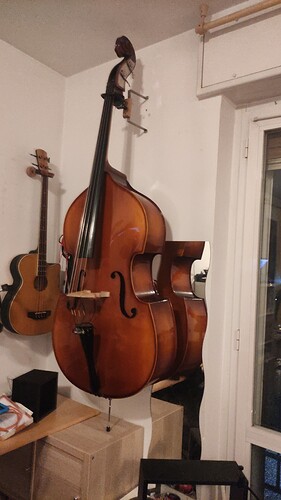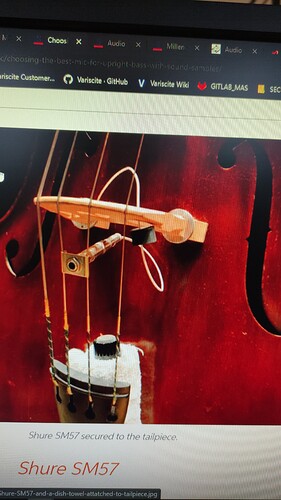Touche’

I bought the EUB a few months ago and really love it. I’ve taken some online bowing courses and even some double bass courses. On the surface, it seems like the same instrument as the bass guitar, but beneath the surface it’s a completely different animal.
Everytime I switch over to the EUB, I have to relearn it. Then when I go back to my bass guitar I have to readapt.
If I was 50 years younger, I’d invest the time to be good at both, but at this stage of my life, I don’t have time. I can only be good at one thing, and bass guitar has to be my focus.
I’m sad to say I must give up on the upright. Not because I’m a quiter, but because I need to focus on one instrument. Bass guitar and double bass (or EUB) are NOT the same instrument!
@Gio your thoughts?
Pam!
Let’s talk.
Sorry for the delay - camping trip, and just got back. It was glorious.
As for upright bass learning vs electric learning… I GET THIS!
It was an absolute shock to me on the upright to realize that when I didn’t spend time on it, I got worse. Actually back tracked. It was terrible. It was also during college under the brutal and scrupulous eye of my bass teacher… After one particularly relaxing summer, he suggested I give up on music altogether.
Yes, they are completely different animals.
Intellectually, you can understand how they both work. Physically and aurally, they require completely different approaches and routines.
I support any decision you make here because I totally get it.
The only thing I’ll say in favor of the upright - it’s rare. People want to hear and see that big upright bass. The only reason I stuck with it was because I had gigs on upright that wouldn’t work on electric.
It fills a niche that the electric bass can’t.
In COVID times it’s rough to play anywhere or with any body… but if you have the patience (and the physical space in your home) you may want to keep the upright around until things open up again. Just shelve it, dust it occasionally, and then - when a group of friends starts playing jazz or folk tunes and want a bass player - bam! There you are with an upright, and a reason to practice.
I’ll support you whatever direction you go here.
I still have my upright, and still end up in scenarios where people want an upright and I get a call… because I own one. It’s not a bad way to go.
Hello everyone!
I am here to give this thread a revival (or a heart attack!)
Here is my new “contrabbasso elettrico”
I always wanted to play the double bass but like many people I had quickly found out that it takes a lot of space and costs a ton of money ( talking about 6-7 years ago before I had access to Thomann)
Recently I started studying Jazz and my instructor was accompanying me with his beautiful set of d-basses while we study the standards. He poisoned me I must say!
He told me there are indeed people who start learning music from zero up on the double bass so I should even have it easier making this switch!
I still cannot have an acoustic double bass since I cannot play at home before my children go to sleep I opted for an electric upright which has the same body shape as an acoustic.
I am loving the reverse tuning (machines are under the bridge) , the fact that I can hang it on the wall like that and how light it really is…
Cool instrument and cool sound, @Fahri !
Keep us posted on progress.
That jazz stuff is hard to do, but so damn fun and rewarding.
I kinda find it liberating to play on the upright. I’m trying to stick to a single position which gives me a limited selection of notes to play from… It is easier for me to loose where I am on the structure of a jazz standard with the electric bass since I would have a tendency to play the chord tones where I am more familiar with on the keyboard…
Now I actually have to think which are the chord tones exactly! Where most of the time they simply lead to the next chord…
My instructor was right when he said “jazz pieces were written for the upright bass”
Absolutely!
Upright bass and walking bass are made for one another!!
Sounds like you’re on a great path here, @Fahri - keep it up!
I miss my EUB. I wish I hadn’t sold it 
I jumped in the deep side once again and took my EUB to the local blues jam…
My right hand particularly was hurting a lot at this point after countless choruses of solos from many musicians and I can see why looking at the video now… I don’t know why I tend to pluck so high on the neck like that…
Still moving forward with the beast!
I notice that I can play comfortably anything around 120-140bpm (10-15 minutes) but anything faster I almost instantly start having muscle strain and even cramps in my right hand particularly. I don’t know if it is related but my instructor got my strings a bit higher (they were very very low) to be able to support playing also with the bow. And since then the strings feel more tense… Any ideas?
My latest recording:
That and rockabilly…man I love the slap of an upright.
hey @Fahri you are coming along nicely!
I have no insight into upright playing, but can go to the basics of …relax your hands, they look tense. Whenever I am ‘working on something’ and concentrating hard, my hands tense up much quicker. When I am just playing without a care I find I can play for hours with no cramping. Same thing goes for sax for me so should go for upright too.
The other thing I see is you are playing for a long long long long time without a break. Small breaks could help too.
Hey there! I think you have a really good point here. My instructor always reminds me not to tense my body because then I start fighting with the EUB. I haven’t have made this connection directly to my hands though…
I try to be mobile on my feet watch my breathing and keep my elbow high etc. But when it is a new piece that I have to read the chord progression these might be going out the window…
This is something that I (and many other) upright players have run into.
I recommend doing lots of shoulder and back and core strength exercises in addition to low action and gentle touch.
Tension is the enemy of everything in your technique. If you feel tense, if you get nervous at faster tempos, it will translate immediately into your arms and hands.
Posture and tension are massive aspects to playing upright.
There’s also just a level of conditioning you need to meet in order to be able to play for longer periods of time and at faster tempos.
It takes time to build up the strength and stamina - I would just urge you to pay careful attention to your posture and tension as you build your strength.
Relax as much as possible!
And - good luck. The instrument is a beast. It is physically and technically difficult in bizarre ways.
There’s a reason all those old jazz greats where stoned all the time……
Hey guys! So I just went all in and got myself a solid top 3/4 from Hora Reghin.
I have traded my Markbass CMD 121P for it which I guess I’ll miss someday but not today!
I was meaning to trade in the EUB but my wife convinced me otherwise… (God I feel lucky)
Anyways now the huge question is how can I mic this thing for a studio rehearsal recording with the band?
There is a pickup at the bridge but the sound it makes is not sounding anything like a db!
Most of the suggested mics are over 200 euros but I came across this comparison
https://www.sweetwater.com/insync/choosing-the-best-mic-for-upright-bass-with-sound-samples/
In there the only economically viable option is the SM57 which even if I upgrade one day it will be useful for something else… What do you guys think?
Shure’s mics are top notch. They are maybe the most durable gear ever created (no, seriously).
SM57 and SM58 are very similar, with the difference mostly being in the shape of the sensitive zone for the mic. The SM57 is made for miking instruments. For dynamic mics it’s one of the best choices you can make at a fraction of the cost of the condenser mics.
Also - there are Behringer clones of Shure mics. Do not buy these. The Shures are much, much better. I have owned Behringer 8500’s, Shure PGA58’s and Shure SM58’s and either of the Shures are far more sensitive and better sounding than the clones.
Another good Shure option would be the SM7B. Much more expensive though.
I already own a 8500 actually maybe it’s worth my time to give it a go? Just to avoid buying something in a hurry before the rehearsal tonight…
8500 is a clone of the SM58 and so is a cardioid designed for vocals and not so directed, so the shape of the sensitivity area will not be optimal. It may work but not nearly as well as an instrument mic.
SM57 is also cardioid but designed for miking instruments.
Congratulations @Fahri !
If you’re recording, then I would recommend doing 2 signals - one from the pickup and one from the microphone (whichever you can afford/use).
In studio sessions the most common mic set up on my upright is a large diaphragm condenser microphone placed about 8" to one foot away from the bridge at the height of the bridge. This picks up the big bass sound, the low frequencies and most of the note. In some studios that want to get more high end, we’ll also put a condenser microphone (smaller - usually the kind used for room mics or drum overheads) closer to the middle of the fret board to pick up the string sound and the high end clicks and clacks.
AND WE ALWAYS take a line from the pickup as well. The pickup sounds fake, but it has very clear and accurate information in it, and when it is blended with the microphone signal it can give you a wonderful upright tone.
The pickup that I used live the most was the Fishman full circle. It was amazing and did everything I wanted it to. I’ve used others, and the Fishman was the best every time.
When you’re just rehearsing with a band, it is generally best to use pickups only through an amp. The microphone options for live playing are difficult because the upright bass is so relatively quiet. In order to get the microphone to translate the bass sound, it has to be gained very high, and ends up picking up the sound of everything on the stage.
I never found a microphone system that I liked, though I tried several.
The studio always worked because I could be isolated and protected from too much sound bleed.
I hope that helps!
Holler with any other questions as this is a world I’ve lived in for a good while!




